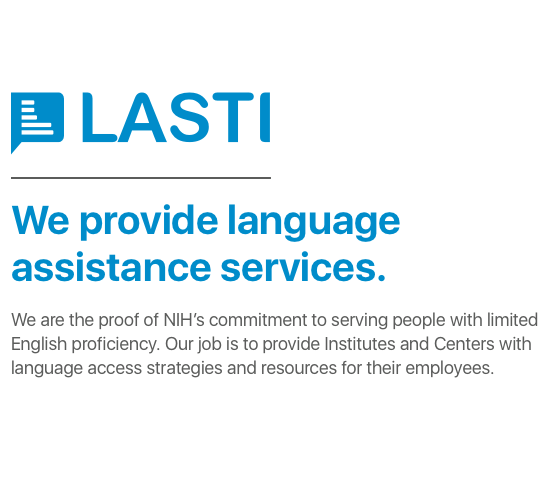LASTI Frequently Asked Questions.
-
Who processes my LASTI request?
Response: After submitting your online request via the LASTI website, the Office of Logistics and Acquisition Operations (OLAO) will conduct a review to ensure that the request being made falls within the scope of the LASTI Contract. An OLAO representative will contact the requestor to provide next steps, including the appropriate IC Consolidated Operations Acquisition Center (COAC), who will process the task order.
-
Can we use the LASTI mechanism to have contracting organizations subcontract for a language not identified in their portfolio?
Response: If the vendor does not offer a specific language, they can propose a subcontract as part of their response to the Request for Task Order Proposal. With four (4) contractors proposing, ICs should assume that all languages are available.
-
Is LASTI a multi-year opportunity with option year availability? If so, for how long?
Response: LASTI contracts have a 12-month base period and four (4) 12-month option periods. We are currently at the end of the base period.
-
Will rates be locked for the entire contract length at the beginning of the contract? If an IC doesn’t contract this year, will there be a different price structure for joining in year 2?
Response: Yes, each year the rates will be different to allow for an economic price increase. If you require a multiple year task order, you may lock in the rates for each year.
-
Will interpreters and translators at all contract organizations be medically certified or is that up to the I/Cs to determine?
Response: The contract requires that interpreters and translators be certified. The IC can determine the certification according to their requirement.
-
How does LASTI differ from the Public Information and Communication Services (PICS) contract mechanism, if at all?
Response: The LASTI "contract mechanism" is not different from the Public Information and Communication Services (PICS) contract mechanism. However, this requirement is under EDI and not OLAO’s Category Management Division.
-
Can this vehicle be used for a one-time job (translation of one pamphlet) or is it better to project if you think you are going to have several materials to translate?
Response: You can request a one-time job.
-
It is my understanding that to use the contract Requests for Proposal (RFP) have to be submitted and the proposals that are received have to be evaluated. Is this correct? Do RFPs always have to be submitted? What if it is a small job that needs a quick turn around?
Response: Yes, we need to send the contractors a Request for Task Order Proposal containing information about the requirement, regardless of size.
-
To pay for the deliverables, do ICs pay up front or does EDI pay and ICs reimburse EDI?
Response: ICs will issue and pay for their own task orders. The process is outlined in the Standard Operating Procedures document. EDI will not pay for services needed by an IC.
-
What is a typical turnaround time from initiation of service request to implementation?
Response: The turnaround time is dependent on the type and size of services being requested. Though LASTI is not a required source, you may acquire quotes directly from each contractor for requirements that are urgent and under $3,500, and pay with a purchase card.
-
How do I conduct market research to fill out the Independent Government Cost Estimate (IGCE)?
Response: Market Research can be conducted via the internet. The General Services Administration (GSA) website is a great resource that contains price schedules you can use to develop an IGCE. See table below and click on the SIN number & Link to Contractors.
URL: www.gsa.gov/language
Foreign Language Services Ordering Guide SIN Number & Link to Contractors NAICS Code SIN Name 382 1 541930 Translation Services 382 2 541930 Interpretation Services -
Where can LASTI services be deployed and/or received?
Response: Interpreting and Translation services will be provided to all NIH Institutes and Centers through this contract. In person interpreting services will occur at multiple Government locations principally serving the main NIH Campus in Bethesda, Maryland and surrounding areas but also remote NIH locations including North Carolina, Arizona, and Montana. Work may take place in any of the NIH's leased or owned facilities in satellite campuses and alternative locations, including events venues and offices.


